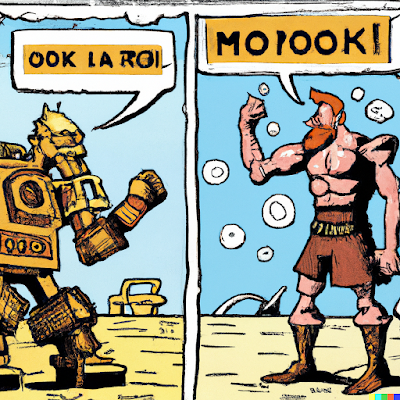Skill-based games struggle with resolving action organically when PCs are hyper-aware of which character is best at what. A player will outline an entire elaborate plan for solving a problem; the DM will call for a roll; and the player will immediately switch gears and start proposing reasons why another PC (who was silent throughout the aforementioned process) should execute the action (because their character has a 5-10% better chance of succeeding).
Some games solve this through various mechanical details or table rules. But can we help the ones that don’t?
Everyone Has Something to Say
While watching the last Guardians of the Galaxy movie, I was struck by how frequently the members of the titular adventuring party undermined their own plans because one or more of them couldn’t keep their mouths shut. Sure, social interaction is easy when the bard does the talking, and everyone else stands mutely behind them. It’s a little more challenging if the barbarian feels the need to interject with unhelpful or overly revealing commentary.
What if there was a game rule that the scene doesn’t end until every character speaks? Or, for larger adventuring parties, at least two characters (besides the charismatic “face”) speak?
The goal is to get some friction into the dialogue. Some PCs will be tempted to just say “yeah, what he said.” PBTA systems and other games that provide a mechanical payoff for the player failing, acting suboptimally to advance the narrative, or otherwise indulging a flaw can do this most easily. But it can work in any kind of game where the players buy into the idea and trust the DM to encourage them to cause interesting problems without responding punitively.
Actions Speak Louder Than Words
Let’s take another page from fiction. Movies, TV shows, and books are good at moving the spotlight from one character to another to make sure the story gives each of them something to do. Many of the same tricks work in a TTRPG.
How to move the spotlight after the face makes their case? It’s easy:
- The chieftain respects strength and strength alone; an arm-wrestling contest with the warrior would bring him around.
- The security system is unmoved by guile; it wants the cyborg to explain why you need to get in, using reason and logic.
- The fence agrees to find the missing artifact, but only if another member of the brotherhood of scoundrels (like, say, the party criminal) personally vouches for the deal.
- The elemental only speaks primordial, the language the dwarf PC got at level one and promptly forgot about. The elemental can’t make sense of the nattering, flighty language of man; say it again, in words of stone and fire.
No More Talk
Implicit in some of the examples above is that a good rule for handling social situations is to know when and how to end the dialogue.
In listening to some actual play podcasts recently, I’ve been driven up the wall by GMs who will let players cajole, wheedle, beg, hector, and berate NPCs long after the interesting part of the conversation has ended. This is doubly bad in a podcast, where the session has to be entertainment for an audience, in addition to the players. But it should still be avoided in games where the players themselves are the only audience.
A terribly underrated tool is to simply say “they don’t buy your arguments and are no longer listening to you. It looks like you’ll have to explore some other way to get what you want, or come back to them after the situation has changed in some way and there’s a new argument to make.” Phrase it as narration rather than in-voice dialogue, so it’s clear that you’re moving on to something else. This can be a little frustrating in the short term to players who want to “win” every interaction and scene they participate in, but it pays dividends in the medium to long term, with tighter, more interesting sessions.





No comments:
Post a Comment